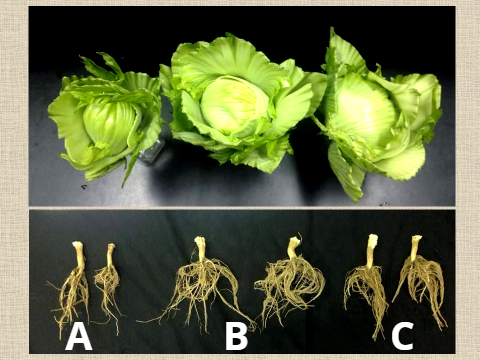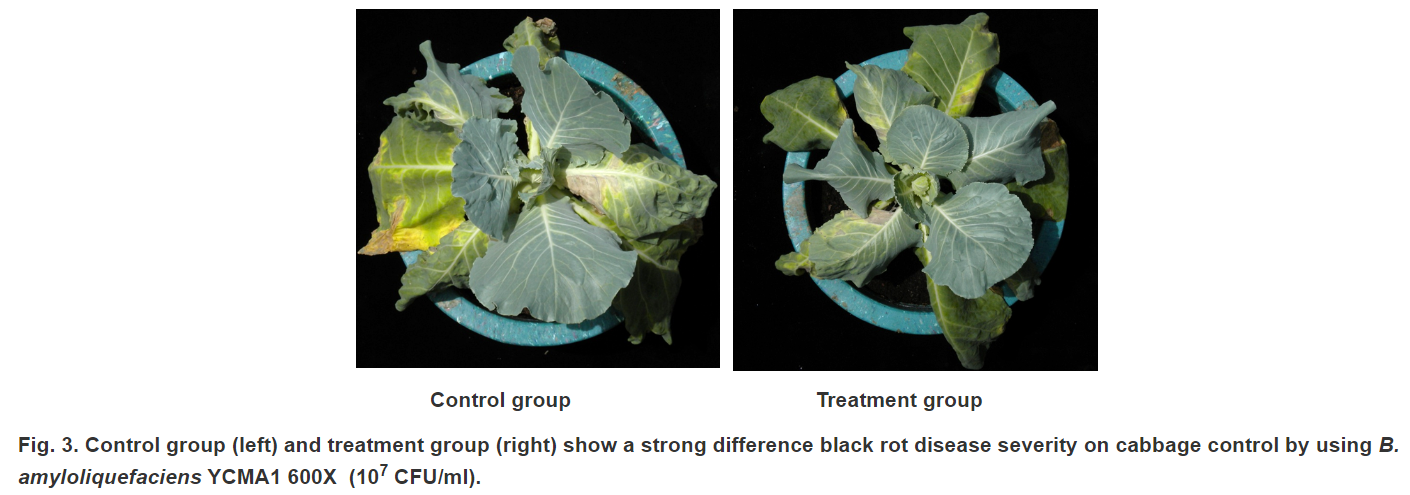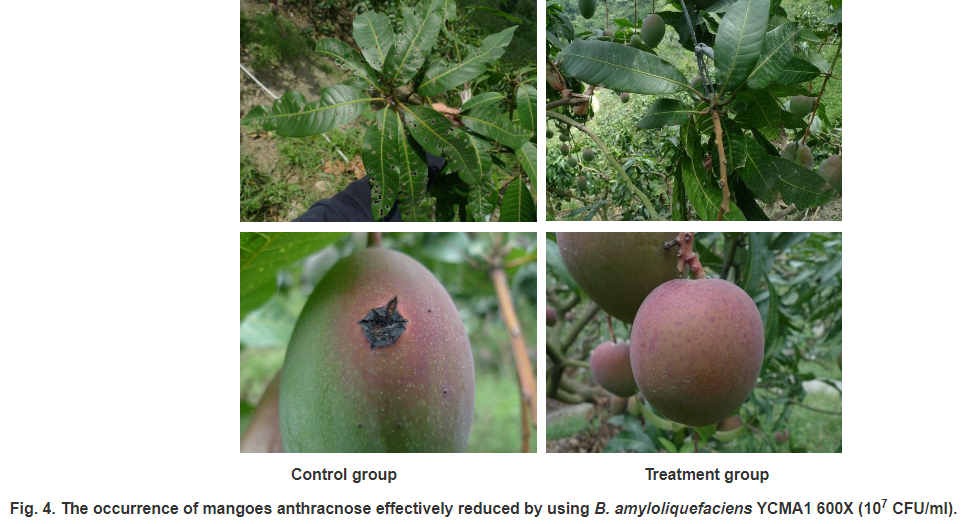Taiwan government has promoted the ten-year program (2018-2027) for reducing chemical pesticide usage by half, so the R&D and commercialization of biopesticides have played an important role, meanwhile, the R&D and commercialization of biofertilizers also have played an important role in rational fertilization.
The R&D team of National Kaohsiung Normal University has identified Bacillus amyloliquefaciens YCMA1, a strain that could promote plant growth and phosphate solubilization, in the mud produced by mud volcanoes. B. amyloliquefaciens YCMA1 had the function of protein and fiber decomposition, and the survival chance of YCMA1 under UV exposure increased after formulation development. The results of field test showed that a combination treatment of B. amyloliquefaciens YCMA1 600X (107 CFU/ml) and chemical fertilizer significantly increased root growth of mustard and yield compared to chemical fertilizer or organic fertilizer (Fig. 1).
In addition, B. amyloliquefaciens YCMA1 could effectively inhibit plant pathogenic fungi, including citrus anthracnose, papaya anthracnose and cabbage black rot, and plant pathogenic bacteria, including citrus canker, tomato bacterial spot, bacterial wilt of tomato, etc. The control experiment of cabbage black rot has showed that spraying B. amyloliquefaciens YCMA1 600X (107 CFU/ml) on leaves of cabbage seedlings every 3 days for 5 times could effectively control black rot (Fig. 2). The disease severity of cabbage in the control group was 39.16%, and that in the treatment group was 25.0% (Fig. 3). Field experiments showed that the disease severity of mango anthracnose on leaves of untreated B. amyloliquefaciens YCMA1 was 35.4%. After 7 months of YCMA1 application, the disease severity of mango anthracnose on leaves decreased to 18.7%, and that on fruit decreased from 55% to 10% (Fig. 4).
Two Taiwan invention patents have been obtained for B. amyloliquefaciens YCMA1, which were " Bacillus amyloliquefaciens and the use of the same" and "production method for fermentation product of Bacillus amyloliquefaciens with property of anti-ultraviolet activity ". B. amyloliquefaciens YCMA1 combined with technologies mentioned above could effectively enhance the ultraviolet resistance of itself and increased the survival concentration in the field. Also, improving the tolerance of B. amyloliquefaciens YCMA1 to chemical pesticides (insecticides, fungicides and herbicides) which is conducive to the application effect of IPM in the field. This product was awarded the 12th National Innovation Award in Taiwan.
The R&D of B. amyloliquefaciens YCMA1 achievements have been successfully technology transferred to Bion Tech Inc. and A-Liang Biotech. Co., Ltd. for registered as biopesticide and biofertilizer products. In the future, it will contribute to the sustainable agriculture and ensure the food safety of consumers.

Fig. 1. A combination treatment of B. amyloliquefaciens YCMA1 600X (107 CFU/ml) and chemical fertilizer (B, middle) significantly increased root growth of mustard and yield compared to chemical fertilizer (A, left) and organic fertilizer (C, right).



The treasure of mud volcanoes
Taiwan government has promoted the ten-year program (2018-2027) for reducing chemical pesticide usage by half, so the R&D and commercialization of biopesticides have played an important role, meanwhile, the R&D and commercialization of biofertilizers also have played an important role in rational fertilization.
The R&D team of National Kaohsiung Normal University has identified Bacillus amyloliquefaciens YCMA1, a strain that could promote plant growth and phosphate solubilization, in the mud produced by mud volcanoes. B. amyloliquefaciens YCMA1 had the function of protein and fiber decomposition, and the survival chance of YCMA1 under UV exposure increased after formulation development. The results of field test showed that a combination treatment of B. amyloliquefaciens YCMA1 600X (107 CFU/ml) and chemical fertilizer significantly increased root growth of mustard and yield compared to chemical fertilizer or organic fertilizer (Fig. 1).
In addition, B. amyloliquefaciens YCMA1 could effectively inhibit plant pathogenic fungi, including citrus anthracnose, papaya anthracnose and cabbage black rot, and plant pathogenic bacteria, including citrus canker, tomato bacterial spot, bacterial wilt of tomato, etc. The control experiment of cabbage black rot has showed that spraying B. amyloliquefaciens YCMA1 600X (107 CFU/ml) on leaves of cabbage seedlings every 3 days for 5 times could effectively control black rot (Fig. 2). The disease severity of cabbage in the control group was 39.16%, and that in the treatment group was 25.0% (Fig. 3). Field experiments showed that the disease severity of mango anthracnose on leaves of untreated B. amyloliquefaciens YCMA1 was 35.4%. After 7 months of YCMA1 application, the disease severity of mango anthracnose on leaves decreased to 18.7%, and that on fruit decreased from 55% to 10% (Fig. 4).
Two Taiwan invention patents have been obtained for B. amyloliquefaciens YCMA1, which were " Bacillus amyloliquefaciens and the use of the same" and "production method for fermentation product of Bacillus amyloliquefaciens with property of anti-ultraviolet activity ". B. amyloliquefaciens YCMA1 combined with technologies mentioned above could effectively enhance the ultraviolet resistance of itself and increased the survival concentration in the field. Also, improving the tolerance of B. amyloliquefaciens YCMA1 to chemical pesticides (insecticides, fungicides and herbicides) which is conducive to the application effect of IPM in the field. This product was awarded the 12th National Innovation Award in Taiwan.
The R&D of B. amyloliquefaciens YCMA1 achievements have been successfully technology transferred to Bion Tech Inc. and A-Liang Biotech. Co., Ltd. for registered as biopesticide and biofertilizer products. In the future, it will contribute to the sustainable agriculture and ensure the food safety of consumers.
Fig. 1. A combination treatment of B. amyloliquefaciens YCMA1 600X (107 CFU/ml) and chemical fertilizer (B, middle) significantly increased root growth of mustard and yield compared to chemical fertilizer (A, left) and organic fertilizer (C, right).